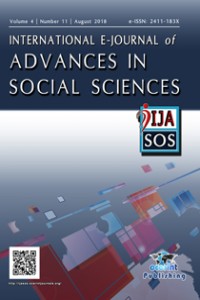Abstract
References
- Bhabha, H. J. (1993). Location of Culture. Routledge. Muravchik, J. (2013). Enough Said: The False Scholarship of Edward Said. World Affairs Journal, Retrieved March/April, 2018, from http://www.worldaffairsjournal.org/article/enough-said-false-scholarship-edward-said Ingraham, J. (n.d.). Labour in Jamaica After Emancipation. University of Miami, Retrieved May, 2018, from https://scholar.library.miami.edu/emancipation/jamaica5.htm Kyte, H. (2010, January 27). The Long Song by Andrea Levy: Review. Retrieved April 24, 2018, from https://www.telegraph.co.uk/culture/books/books-life/7087391/The-Long-Song-by-Andrea-Levy-review.html Lake, O. (2003). Blue veins and kinky hair: Naming and color consciousness in African America. Westport, CT: Praeger. Levy, A. (2010). The Long Song. New York: Straux and Giroux. Missouri, M.A. (2015). Black Magic Woman and Narrative Film: Race, Sex and Afro-religiosity. London: PALGRAVE MACMILLAN. Muñoz-Valdivieso, S. (2016). “This tale is of my making”: Empowering voices in Andrea Levy’s The Long Song. Journal of Postcolonial Writing, 52(1), 38-50. doi:10.1080/17449855.2015.1125147 Said, E. W. (1995). Orientalism: Western conceptions of the orient. London: Penguin. Stuart, A. (2011, October 23). The Long Song, By Andrea Levy. Retrieved January, 2018, from https://www.independent.co.uk/arts-entertainment/books/reviews/the-long-song-by-andrea-levy-1889489.html
Abstract
The theory of hybridity and ambivalence is not
something that is alien to the postcolonial world. First derived from power
relations between the colonizer and the colonized, it has now evolved into many
different branches. What is understood from it is that it shows that the
relationship between those who hold power and those who are under the rule of a
people is never clear-cut. It is a give and take relationship and gives many
illusions as to how one views the other. Cross-cultural relations are definitely
very complex and we can see this in The
Long Song. We are always creating new identities as the world becomes more
and more globalized. The notion that a culture has to remain unadulterated is a
concept that is almost irrelevant. We are constantly creating new identities to
help us cope with the different experiences that we have and once we are
exposed to it, our way of thinking can never go back to the original. In this
paper, I will draw a connection between July’s belonging, identity, and her
ability to connect with the many people in her life, from her Mistress Caroline
to Massa Robert Goodwin and later, her son and other black or Mulatto people,
to the theory on ambivalence and hybridity by Homi Bhabha. At the end of the
paper, one will be able to articulate that, given the history of Jamaica, the
traits that many postcolonial subjects display go hand in hand with Bhabha’s
theories on ambivalence and hybridity. The discourse on postcolonial subjects,
even more recent ones, has shown a tendency to correlate with the experiences
of their predecessors such as those who were colonized.
Keywords
References
- Bhabha, H. J. (1993). Location of Culture. Routledge. Muravchik, J. (2013). Enough Said: The False Scholarship of Edward Said. World Affairs Journal, Retrieved March/April, 2018, from http://www.worldaffairsjournal.org/article/enough-said-false-scholarship-edward-said Ingraham, J. (n.d.). Labour in Jamaica After Emancipation. University of Miami, Retrieved May, 2018, from https://scholar.library.miami.edu/emancipation/jamaica5.htm Kyte, H. (2010, January 27). The Long Song by Andrea Levy: Review. Retrieved April 24, 2018, from https://www.telegraph.co.uk/culture/books/books-life/7087391/The-Long-Song-by-Andrea-Levy-review.html Lake, O. (2003). Blue veins and kinky hair: Naming and color consciousness in African America. Westport, CT: Praeger. Levy, A. (2010). The Long Song. New York: Straux and Giroux. Missouri, M.A. (2015). Black Magic Woman and Narrative Film: Race, Sex and Afro-religiosity. London: PALGRAVE MACMILLAN. Muñoz-Valdivieso, S. (2016). “This tale is of my making”: Empowering voices in Andrea Levy’s The Long Song. Journal of Postcolonial Writing, 52(1), 38-50. doi:10.1080/17449855.2015.1125147 Said, E. W. (1995). Orientalism: Western conceptions of the orient. London: Penguin. Stuart, A. (2011, October 23). The Long Song, By Andrea Levy. Retrieved January, 2018, from https://www.independent.co.uk/arts-entertainment/books/reviews/the-long-song-by-andrea-levy-1889489.html
Details
| Primary Language | English |
|---|---|
| Journal Section | Articles |
| Authors | |
| Publication Date | August 31, 2018 |
| Submission Date | June 10, 2018 |
| Published in Issue | Year 2018Volume: 4 Issue: 11 |
Contact: ijasosjournal@hotmail.com
The IJASOS Journal's site and its metadata are licensed under CC BY
Published and Sponsored by OCERINT International © 2015- 2025


